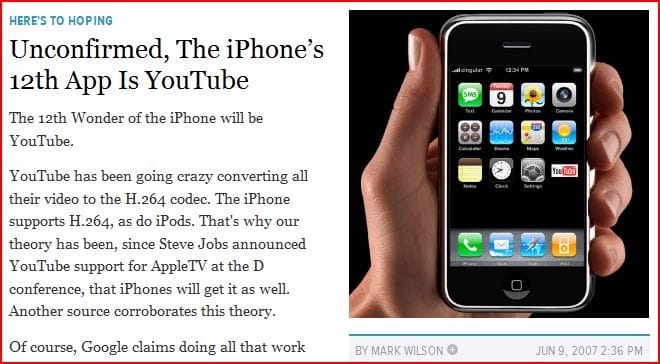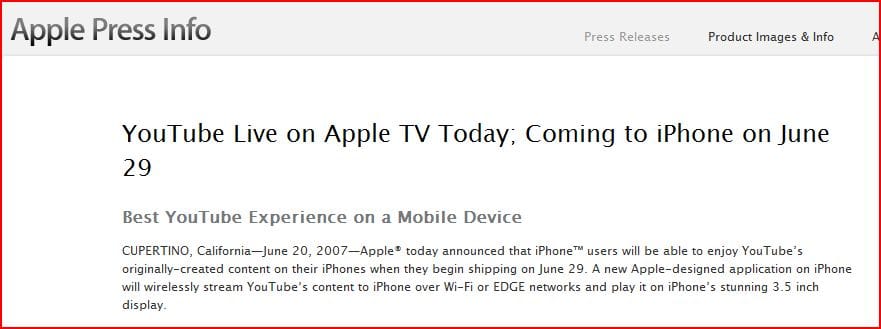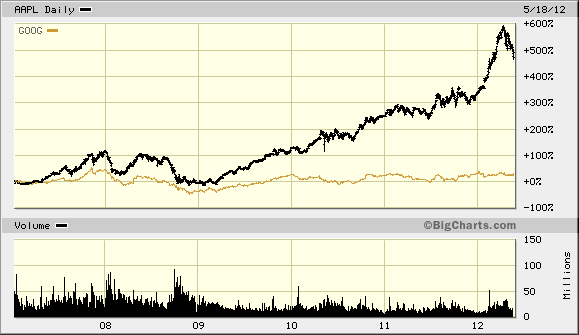Apple’s biggest app supplier: Google

You won’t find Google on Apple’s list of its suppliers (it’s here in PDF form if you want to check). But they should absolutely be there right between ‘Fujikura‘ and ‘Grand Upright TechnologyLtd.’, because Google is one of the most critical suppliers in the iOS ecosystem. And Apple has only themselves to blame for that.
Apple introduced the iphone in January of 2007, just before the housing/financial/Britney crisis. Here’s what Gizmodo said before Apple made it official:

And Apple thought enough of Youtube on the iphone to put out a press release with a Steve Jobs quote:

“iPhone delivers the best YouTube mobile experience by far,” said Steve Jobs, Apple’s CEO. “Now users can enjoy YouTube wherever they are—on their iPhone, on their Mac or on a widescreen TV in their living room with Apple TV.”
When Steve Jobs praises a product and uses it to sell his own, you know it’s a big deal. That’s why Google was more than happy to pay $1.65 billion for YouTube the year before. They just couldn’t afford for someone else to own such a critical piece of global search queries. And video, especially mobile video, has only grown in value. Check out what Citi said in research note about YouTube:
“Over time, we have become increasingly impressed by the size and growth of Google’s YouTube asset. Further, we view YouTube as giving Google a great platform against two of the biggest trends on the Internet today – the Migration of TV/Video Ad Budgets to the Internet and the Rise of Social Networks, specifically Facebook. Put it this way, we believe that Google’s long-term value would be materially less if it didn’t own YouTube.”
How much less? Well YouTube will do ~$1.1 billion in sales for 2012. Facebook went public around ~25x revenues. Cut that multiple in half and apply it to YouTube and the video site is worth ~$12 billion. Google really does owe the Lazy Sunday guys a check.
And Google’s mobile plans have only accelerated as more and more of YouTube goes mobile. They didn’t spend $12.5 billion on Motorola just for the patents, they needed a device maker in house to further the Android ecosystem and make the whole thing more robust and unified to deliver that increasingly valuable mobile content. If you look at Google vs Apple’s stock price since the iphone announcement you’ll see why Eric Schmidt wants to be paid juicy subsidies for mobile devices.

So it’s no wonder that Apple and Google took their respective representatives off each other’s board (which was probably illegal to begin with). YouTube is totally synonymous with video on the web, thanks to Apple’s decisions in 2007. YouTube is the defacto standard for mobile video search. Google doesn’t want Apple to have access to that YouTube search data, so they’ve let the official Youtube app languish, driving video-hungry consumers to search directly on mobile browsers. Apple may have been able to author Adobe’s demise in mobile flash but killing Youtube would require more than Steve Jobs manifesto. Cupertino would have to directly block YouTube on the iphone and ipad. And that’s obviously not going to happen.
I’d argue that Google totally took Apple to the cleaners by having Eric Schmidt on the board. Android hasn’t grabbed so much mobile market share by being a slapdash operation. Google clearly saw Apple’s mobile designs in 2006 and saw it as an existential threat to their business. The logic is pretty easy to follow: if consumers are hooked and loyal to a device (like the iphone) rather than a service (like Google) then the device maker holds all the chips. So Google did what all companies do and what Steve Jobs did in another lifetime to Xerox: they stole Apple’s mobile plans wholesale, using YouTube as a trojan horse.
So what’s Apple going to do now that they’ve lost the battle over video to Google? My bet is that they move on to another battle and launch their own version of maps in the next iphone. Real turn-by-turn navigation is one thing that iphone does lack, and using Siri (partially powered by Nuance) could enable Apple to finally offer an elegant solution of their own. And unlike video, maps works way better as a stand-alone App, which means Apple can potentially outdo Google on that front. If Apple were to give Google Maps the heave-ho it could comes as early as June 11th during the WWDC conference (cue Garmin panic attack). You better believe that Apple is figuring out any way it can to lessen it’s dependence on Google as a supplier.

